- March 30, 2024
Does The Full Moon Affect Cats? What Science Says
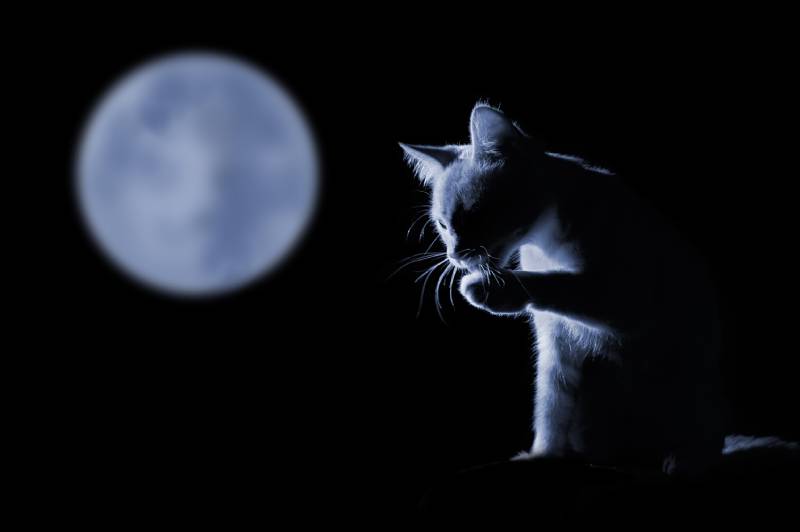
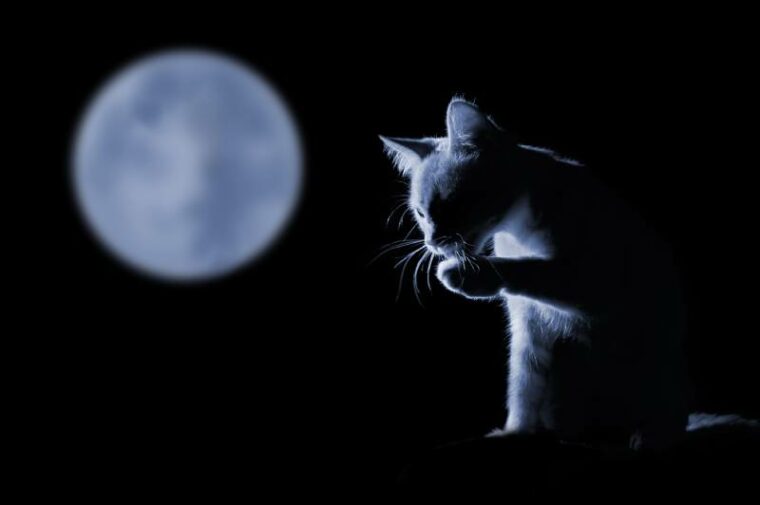
The moon is a magnificent sight, and its energy is strong enough to cause waves in our oceans. It is also not uncommon for people and animals to behave strangely during the full moon.
The idea that the full moon affects the behavior of animals, including cats, has been a topic of speculation and folklore for centuries, but even if it is untrue, some odd animal behavior patterns have been connected to the lunar cycle.
As a general answer, much of the scientific community harbors doubt regarding the notion that the full moon exerts any substantial influence on animal behavior. In this article, we’ll discuss what we know about the full moon and its impact on our feline friends.

How the Moon Affects the Earth
Due to the incredibly strong magnetic attraction that exists between the moon and the Earth, the moon affects the Earth every day. When the Earth and moon are closest to one another, and the moon is directly overhead, the moon’s gravitational pull on Earth is at its strongest.
This varies as the moon cycle changes, and when the sun lines up with the moon and earth, strong energy is produced by the sun’s gravitational pull. The direction of ocean currents and the resulting tides are caused by this force, which impacts the planet’s vast bodies of water. The tides are also at their highest when the moon is full.
We may all act oddly during the full moon, so it is not unreasonable to assume that all living things, including your cat, can be affected by the moon’s activity, given that our tides and many other natural occurrences depend on it.
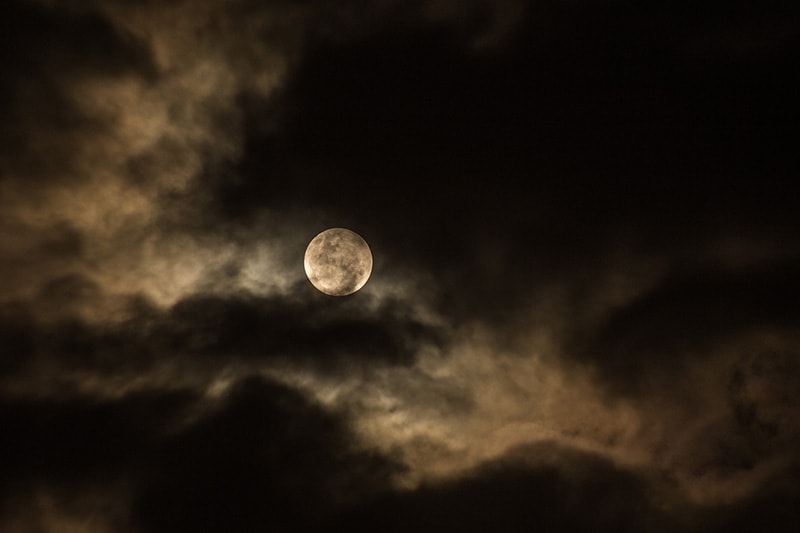
Does the Full Moon Affect Cats?
Several pet owners believe that their pets are affected during the full moon. While some dogs are known to howl like wolves, cats display less obvious behaviors, such as hiding and behaving more mischievously.
However, the scientific community remains largely skeptical about the full moon having any significant impact on animal behavior. Studies conducted on various species, including domestic animals, have found little to no evidence to support the idea that the full moon affects their behavior in any meaningful way.
How cats are affected by the full moon is unknown, but there are statistics to show that veterinary clinics are generally busier during this phase. According to research by the University of Colorado College of Veterinary Medicine, cats had a 30% higher risk of suffering an injury during or close to a full moon.
The causes of this are still unknown, but it could be because cats spend more time outside at night because of the bright light of the moon, which may increase the chance of injury.
The effect on a cat’s circadian rhythm, which is the change in physical, behavioral, and emotional highs and lows, may also be to blame. Some people believe the moon affects a cat’s circadian rhythm the same way it affects the tides and nighttime lights and, therefore, affects their sleeping patterns, heart rate, temperature, hormones, and overall behavior.

How Are Cats Known to Behave During the Full Moon?
Both cat owners and vets have observed that cats seem to act more mischievously when the moon is full. However, certain cats might also be more likely to hide, meow, or be more vocal.
Additionally, they may sleep more, show more feelings of fear, and actively seek out the company of other furry buddies. The full moon may cause a cat prone to anxiety and fear to become jittery and afraid of things in their environment.
Some will jump higher, run around the house faster, or play more enthusiastically than usual. In rare instances, your cat might also become a little bit more aggressive than usual.
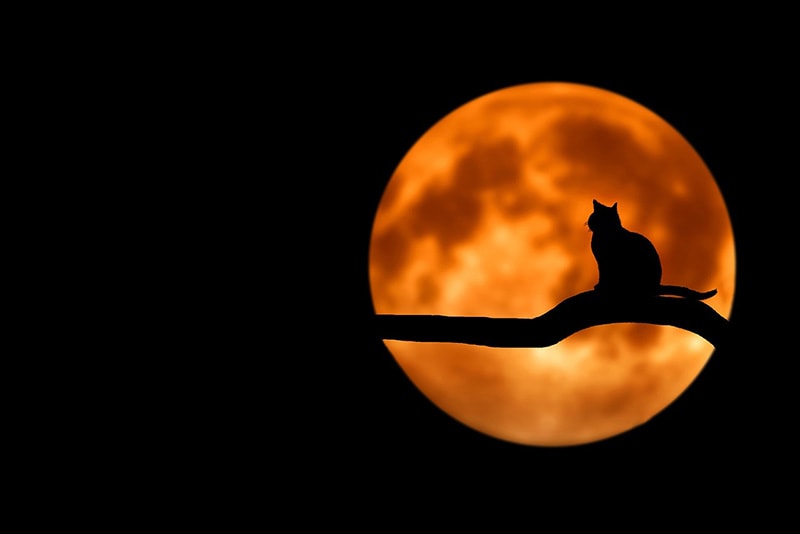
Do Other Phases of the Moon Affect Cats?
The belief that the moon’s phases can influence animal behavior is primarily based on folklore and anecdotal evidence. While it’s true that some animals, including cats, can be sensitive to changes in their environment, there is no conclusive scientific proof that the moon’s phases significantly impact their behavior.
The full moon is only one phase of the lunar cycle, and many believe that the other cycles of the moon may also carry a unique energy and have an effect on animals, including cats.
- New Moon: At this time, the moon is harder to see since it is closer to the sun. New moon energy typically manifests as slower, more passive, and more relaxed. The new moon encourages intention and serves as a period to fully tune into nature. Cats appear to be intuitive about the need to unwind during this stage.
- Waxing Moon: The waxing moon is known as “yin energy,” and the energies tend to be gentle, mellow, laid-back, and passive. For the animal kingdom, this is a time of peace, slowing down, resting, and sleeping.
- Waning Moon: Since the waning moon is “yang energy,” it manifests as positive, fiery, hard, and restless energy as the moon transitions from full to new. Animals engage in hunting, gathering food, and home preparation during this stage, which awakens their natural nesting instinct.
- Super Moon: Animals are said to be more perceptive than usual during the supermoon. Your cat may be able to sense the energies around them quicker and more deeply, making stressful situations feel considerably worse.
- They will interact with objects around them more quickly because their survival instinct is on high alert.
- Blue Moon: Blue moons only happen once every 3 years. They occur when there are two full moons in a calendar month, and you can expect a double dose of the full moon energy for your cat.
- Blood Moon: Blood moons occur when the earth passes precisely in front of the moon and the sun, blocking off the sun’s light and causing the moon to lose its characteristic yellow brightness and develop a reddish glow.
Your cat may seem a little off-balance or exhausted due to the immense energy, which is not too dissimilar from a full moon but is more intense.
What Should I Do If My Cat Seems Affected by the Full Moon?
Unfortunately, it doesn’t appear like there is much a cat owner can do to control this odd behavior. We suggest following the moon cycles to be more prepared. You could keep your cat inside for safety during the full moon and ensure your cat has a safe place to hide.
If you notice changes in your cat’s behavior during a full moon, it’s essential to rule out any underlying health issues or environmental factors that could be causing the changes. If your cat becomes more vocal, restless, or exhibits other behavioral changes, it’s a good idea to consult your veterinarian to rule out any health concerns.
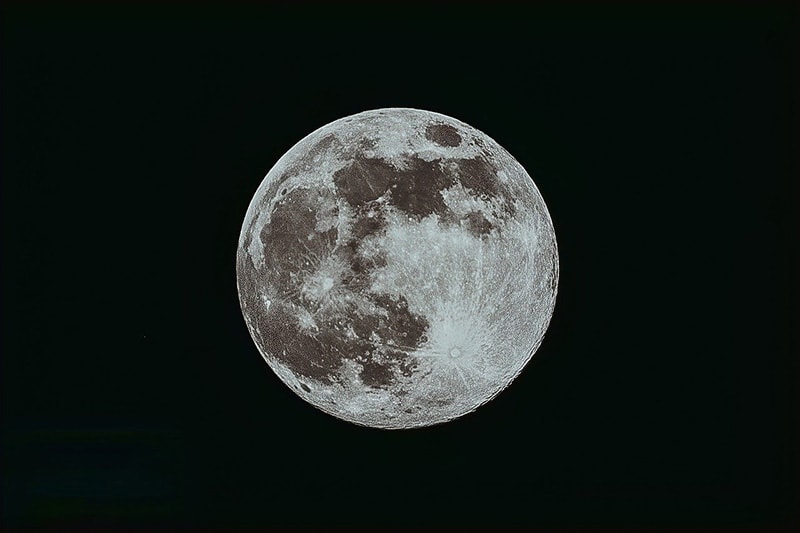

Final Thoughts
While the idea that the full moon can affect cats is intriguing, no scientific evidence supports this claim. Some owners may notice a change in behavior around the full moon, but other cats may show no difference. The more we learn about cats and their environments, the more we all come to know them.
If you have concerns about your cat’s behavior, it’s best to contact your veterinarian or a qualified animal behaviorist, but if all medical issues are ruled out, you may have to tolerate a wild feline during the full moon.
Featured Image Credit: Khorzhevska, Shutterstock
Tags
What do you think?
Related Articles

New Puppy Checklist: Gear You’ll Need for Your New Dog
Getting a new puppy is really exciting, but before you welcome them home, it’s important to prepare your space for them. Since puppies need a

How Big Do Mini Poodles Get? Vet Reviewed Average Weight & Growth Chart – Dogster
The information is current and up-to-date in accordance with the latest veterinarian research. Learn more » When you buy a Miniature Poodle, you might not

Can Police Dogs Smell Nicotine? Vet Verified Facts & Info – Dogster
The information is current and up-to-date in accordance with the latest veterinarian research. Learn more » While cigarette sales have been declining steadily for decades,

How Old Is 5 in Dog Years? Vet-Approved Guide to Each Size of Dog – Dogster
The information is current and up-to-date in accordance with the latest veterinarian research. Learn more » A common method for calculating a dog’s age is

